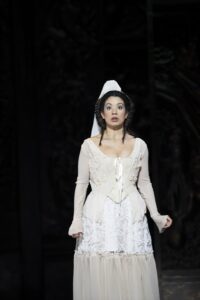Jessica Harris watches this Welsh National Opera production at Birmingham Hippodrome.
Surely one of the most evil characters to grace the stage, were he around today Don Giovanni may well be labelled a narcissist. With his long white coat, its single epaulette braided and tasselled, his wide brimmed hat topped by an ostentatious feather, he is the man. Or so he thinks. His character, full of moral ambivalence, is intriguingly revealed through Mozart’s music.
The overture’s opening chords, extended through dramatic pauses, foreshadow the dark tragedy which is to unfold. On stage, Don Giovanni’s status and vigour are indicated by Mozart’s use of the major key and by bold musical passages. Giovanni’s baritone gives him scope to move from a deep and menacing voice to a softer one, producing sweet melodies when an opportunity for seduction comes his way, as it does frequently. This is a person for whom self-doubt does not exist.

As a foil to his evil nature, the other characters in this opera are motivated by genuine emotions, ranging from love and tenderness, to grief and anger, to the desire to avenge the wrongs they have suffered. Mixing tragedy with comedy, and combining love with moments of farce, Don Giovanni covers a panoply of feelings and desires. Widely seen as Mozart’s greatest opera, it does not shy away from the complexity of what it is to be human.
Don Ottavio’s aria declaring that his happiness is inextricably linked to that of Donna Anna is a moment of true empathy expressed through heartfelt melody, whilst Zerlina’s aria of love to her fiancé Masetto is full of affection and knowing sensuality.
Grief drives Donna Anna, her anguish being expressed through the minor key, whilst Elvira, one time lover of Giovanni, shifts between her urge for revenge and her unrequited love for the man who has abandoned her.
But perhaps the most significant contrast to anti-hero Giovanni is his servant Leporello. Witness to Giovanni’s crimes, he is at times cowed by his master’s bullying, at times determined to escape his clutches, and at times an observer and a critic. In his aria, ‘My dear lady, this is the catalogue’, when he reveals to Elvira the lengthy list of Giovanni’s conquest, he is pure cynic.
As the Commendatore, Donna Anna’s murdered father, comes to take revenge, the key switches to D minor, sinister tones are expressed through ascending and descending scales, and the crescendo builds. The unrepentant Don Giovanni descends to the flames of hell.
The quality of singing was enchanting, and the depth of emotional expression made for compelling watching. Whilst it is hard to single out any one performer, Duncan Rock as Don Giovanni displayed style, arrogance and presence, Meeta Raval sung her heart out as Elvira, and Kenneth Tarver as Don Ottavio had a quality of voice that swept you along.
The subdued colour palette of the costumes enabled the showy white of Don Giovanni’s garb to stand out. Lighting contributed to the sense of rising tension. The set, made up of carved blocks which allowed for creation of different spaces, was somewhat overpowering, particularly for the more romantic scenes. The statue of the Commendatore appeared at the outset to foreshadow the tragedy about to befall. A rather odd looking piece, it might have been better to reserve its impact for the final scene, and to make more use of the lesser, but more plausible-looking statues which appeared from time to time to convey foreboding.
The Conductor was Frederick Brown and Director was Caroline Chaney.
Don Giovanni is on national tour until 13th May. More information.
Pics – Bill Cooper


